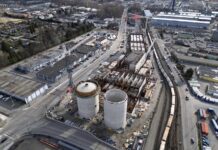METRO Vancouver is now issuing an Air Quality Advisory for eastern parts of Metro Vancouver and the Fraser Valley because of high concentrations of ground-level ozone that are expected to persist through the week.
Hot and sunny weather is forecasted to continue through to the weekend. A plume of wildfire smoke from the Nohomin Creek fire (near Lytton, BC) is currently contributing to hazy conditions over the region but there has been no significant impact on measured fine particulate matter concentrations at ground-level.
Ground-level ozone is not emitted directly into the air. It is formed when nitrogen oxides (pollutants emitted when fuels are burned) and volatile organic compounds (emitted from solvents and other sources) react in the air in the presence of sunlight. The highest levels of ground-level ozone are generally observed between mid-afternoon and early evening on summer days.
Avoid strenuous outdoor activities during mid-afternoon to early evening, when ozone levels are highest, especially if breathing feels uncomfortable. Consider choosing easier outdoor activities, such as walking instead of running, where you don’t have to breathe as hard.
Exposure is particularly a concern for people with underlying conditions such as lung disease, heart disease, chronic obstructive pulmonary disease (COPD) including bronchitis and emphysema, as well as asthma, and/or diabetes; individuals with respiratory infections; pregnant women and infants; children; older adults; and outdoor workers (e.g. construction and agricultural workers).
Individuals who are socially marginalized may also be at elevated risk (e.g. people who are experiencing homelessness or are underhoused).
As we are in the summer season with warm temperatures, it is also important to stay cool and hydrated. Indoor spaces with air conditioning may offer relief from both heat and air pollution. Consider using a portable air conditioner to keep your indoor space comfortable (if you do not have central air conditioning).
If you are experiencing symptoms such as chest discomfort, shortness of breath, coughing or wheezing, seek prompt medical attention. Call 911 in the case of an emergency.
Metro Vancouver works in cooperation with Environment and Climate Change Canada, Fraser Valley Regional District and BC Ministry of Environment and Climate Change Strategy to look after air quality.
Information about real-time air quality readings for Metro Vancouver and Fraser Valley communities and potential health impacts can be found at www.airmap.ca and www.env.gov.bc.ca/epd/
To sign up for air quality alerts in your area, go to www.metrovancouver.org/











